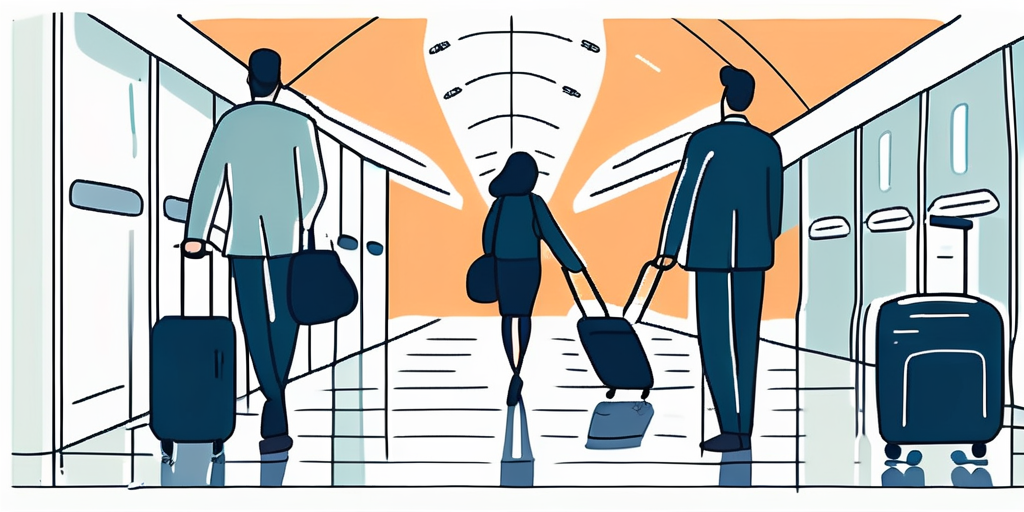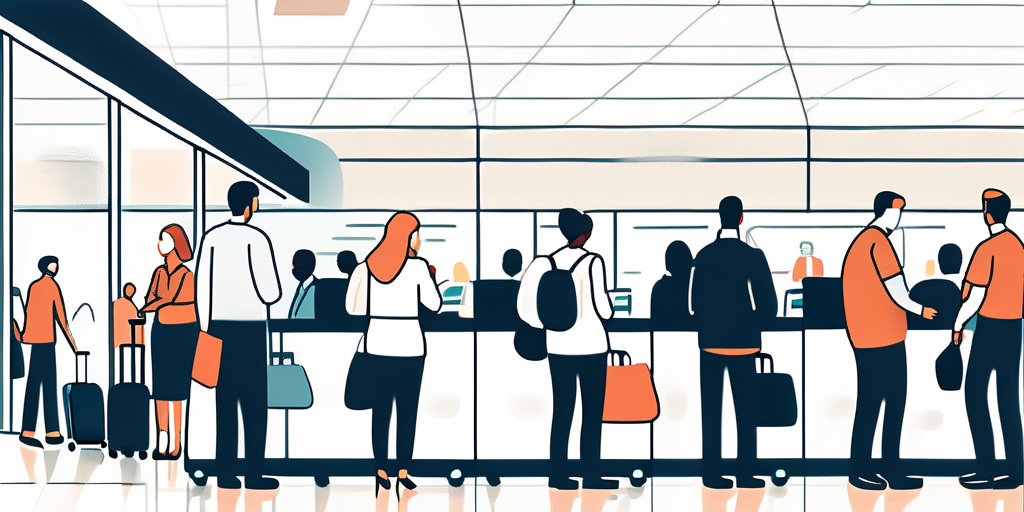Why Overbooking Flights Should Be Illegal
Explore the debate on whether overbooking flights should be illegal. Get the legal implications, and public opinions on this contentious issue.
In recent years, the practice of overbooking flights has become a topic of intense debate and controversy. Many argue that it is a deceptive and unfair practice that should be deemed illegal. In this article, we will delve into the various aspects of overbooking flights and explore why it should be prohibited.
Understanding the Concept of Overbooking
Before diving into the reasons why overbooking flights should be illegal, it's important to first understand what overbooking entails. Airlines often sell more tickets for a particular flight than there are available seats on the aircraft. This is done based on an industry-wide statistical model that estimates the number of passengers who will cancel or miss their flights. However, the flaw in this system becomes evident when all the passengers show up and there are not enough seats to accommodate them all.
The Business Model of Airlines
Airlines operate on a tight profit margin, and overbooking flights has become a common strategy for them to maximize revenue. By intentionally selling more tickets than there are seats, airlines ensure that even if some passengers do not show up, they can still fill all the available seats and avoid financial losses. This practice is based on the assumption that a certain percentage of passengers will cancel or miss their flights.
The Process of Overbooking Flights
When all passengers do show up, airlines are faced with the dilemma of accommodating everyone with limited seating options. In these situations, airlines resort to desperate measures such as offering compensation for volunteers to give up their seats or involuntarily denying boarding to some passengers. The latter often leads to distressing scenes and heated arguments at departure gates, leaving passengers frustrated and embittered.
Let's take a closer look at the process of overbooking flights. It begins with the airlines' statistical models, which are designed to predict the number of cancellations and no-shows for a given flight. These models take into account historical data, seasonal trends, and other factors that may influence passenger behavior. However, despite the sophistication of these models, they are not foolproof. Unforeseen events, such as severe weather conditions or sudden changes in travel plans, can disrupt the accuracy of the predictions.
Once the decision to overbook a flight is made, airlines start selling more tickets than there are available seats. This is done with the hope that the statistical model's predictions will hold true, and the excess passengers will cancel or miss their flights. However, as we have seen, this is not always the case. When all passengers show up, chaos ensues.
Airlines then face the challenge of finding a solution to this problem. They may first ask for volunteers to give up their seats in exchange for compensation, such as travel vouchers or cash. This approach is often successful, as some passengers may be willing to adjust their travel plans in exchange for a reward. However, when there are not enough volunteers, airlines may resort to involuntarily denying boarding to some passengers.
This process can be highly distressing for passengers who find themselves involuntarily denied boarding. They may have meticulously planned their trip, only to be told at the last minute that they cannot board the flight they booked and paid for. This can lead to frustration, anger, and even legal disputes between passengers and airlines.
In conclusion, the practice of overbooking flights is deeply rooted in the business model of airlines, driven by the need to maximize revenue and minimize losses. However, when all passengers show up, the consequences can be chaotic and distressing for both passengers and airlines. It is a complex issue that warrants further examination and consideration of alternative solutions to ensure a fair and satisfactory travel experience for all.
The Legal Perspective on Overbooking
While some argue that overbooking flights is a necessary evil for the airline industry, there are valid concerns about the legality and ethics of this practice that cannot be overlooked.
 From a legal standpoint, overbooking flights raises questions about consumer rights and the responsibilities of airlines towards their passengers. The practice of overselling seats can lead to situations where travelers are involuntarily denied boarding, causing inconvenience and frustration. This has sparked debates about the need for more stringent regulations to govern overbooking policies and ensure fair treatment for all passengers.
From a legal standpoint, overbooking flights raises questions about consumer rights and the responsibilities of airlines towards their passengers. The practice of overselling seats can lead to situations where travelers are involuntarily denied boarding, causing inconvenience and frustration. This has sparked debates about the need for more stringent regulations to govern overbooking policies and ensure fair treatment for all passengers.
Current Laws and Regulations
Currently, there are laws and regulations in place that allow airlines to overbook flights within certain limits. However, these regulations are often vague and open to interpretation, leaving room for exploitation. This lack of clear guidelines enables airlines to prioritize their profit over the rights and well-being of passengers.
Moreover, the existing legal framework may not adequately address the evolving landscape of air travel and the challenges posed by overbooking. As the industry continues to grow and passenger demand increases, there is a pressing need to revisit and revise these regulations to better reflect the interests of consumers and ensure a more equitable balance between commercial interests and passenger rights.
The Need for Stricter Legislation
Given the increasing number of incidents and the negative impact on passengers, it is crucial to establish stricter legislation to protect the rights of customers. Passenger safety and comfort should be paramount, and overbooking flights undermines both of these aspects. By making overbooking illegal, airlines would be forced to prioritize passenger satisfaction and ensure that every ticket sold guarantees a seat on the aircraft.
Furthermore, stricter legislation would serve to hold airlines more accountable for their overbooking practices and provide a legal recourse for passengers who have been unfairly treated as a result of oversold flights. This would not only enhance consumer protection but also promote transparency and accountability within the airline industry, fostering a more trustworthy and passenger-centric environment for air travel.
The Impact of Overbooking on Passengers
The practice of overbooking flights not only causes inconvenience but also has a significant impact on passengers, both emotionally and financially.
Overbooking is a common practice in the airline industry where airlines sell more tickets than the actual number of seats available on a flight. While airlines overbook flights to maximize their revenue and account for potential no-shows, this practice can lead to a myriad of issues for passengers.
Emotional and Physical Stress
Being denied boarding despite having a valid ticket can be a highly distressing experience for passengers. It can lead to feelings of frustration, anger, and helplessness. Furthermore, passengers are often forced to endure long waits and uncertainty, as they do not know if they will be able to embark on their planned journey. This can result in significant emotional and physical stress.
The uncertainty surrounding overbooked flights can also take a toll on passengers' mental well-being. The lack of transparency in the overbooking process can leave travelers feeling anxious and unsettled, especially when faced with the prospect of being bumped off a flight at the last minute.
Financial Implications
In addition to the emotional toll, overbooking flights can also have serious financial consequences for passengers. Those who are involuntarily denied boarding may incur additional expenses, such as hotel accommodations, alternative transportation, and missed connections. Moreover, missed opportunities due to delayed or canceled flights can result in financial losses for individuals who had time-sensitive commitments.
Furthermore, the financial impact of overbooking extends beyond immediate out-of-pocket expenses. Passengers who experience disruptions due to overbooking may also face indirect costs such as lost productivity, missed events, and potential damage to their professional or personal reputation.
The Ethical Implications of Overbooking
Beyond the legal and financial aspects, overbooking flights raises important ethical considerations that cannot be disregarded.

Breach of Trust and Fairness
Overbooking flights is a breach of trust between airlines and their customers. Passengers expect that by purchasing a ticket, they are guaranteed a seat on the flight they have chosen. When airlines overbook flights, this trust is shattered, and passengers are left feeling betrayed and undervalued. Furthermore, it raises questions about fairness and the ethical treatment of customers who find themselves in these situations.
Corporate Responsibility and Ethics
As corporations, airlines have a responsibility to conduct their business in an ethical manner that prioritizes the well-being and satisfaction of their customers. Overbooking flights goes against this principle, as it prioritizes financial gain over the rights and happiness of passengers. By making overbooking illegal, airlines would be held accountable for their actions and forced to adopt more ethical practices.
Possible Solutions to Overbooking
While it is necessary to highlight the problems associated with overbooking flights, it is also important to explore potential solutions that can contribute to a more passenger-friendly airline industry.

Implementing Advanced Booking Systems
Advancements in technology can play a crucial role in minimizing the need for overbooking flights. By improving booking and ticketing systems, airlines can better predict passenger behavior, allowing them to sell the exact number of tickets for each flight without resorting to overbooking. This would lead to a more efficient and transparent process, benefiting both the airlines and passengers.
Encouraging Voluntary Surrender of Seats
Another solution to overbooking flights is to incentivize passengers to voluntarily surrender their seats when a flight is oversold. Airlines can offer various benefits, such as flight vouchers, upgrades, or cash compensation, to encourage passengers to choose a later flight. This approach would give passengers more control over their travel plans while minimizing the negative impact of overbooking.
Conclusion
Overbooking flights is a contentious practice that compromises passenger rights, trust, and well-being. While airlines may benefit financially from this questionable strategy, it is imperative to prioritize the needs and satisfaction of passengers. By making overbooking illegal and implementing alternative solutions, the airline industry can enhance its reputation and provide a more equitable and enjoyable travel experience for all.
Seek Justice for Your Overbooked Flight with ClaimCompass
If you've been a victim of an overbooked flight, you don't have to accept the frustration and helplessness that come with it. ClaimCompass is here to champion your rights and help you claim up to 600€ in compensation. Our expertise in EU Regulation 261/2004 and our commitment to air passenger rights in Europe make us your ideal ally in these situations. Don't worry about the hassle of dealing with airlines or legal hurdles; we'll handle your claim from start to finish. Check your eligibility for free with our compensation calculator and let us take care of the rest. Remember, you pay nothing unless we secure your compensation. Ready to turn your disrupted travel experience into the compensation you deserve? Submit a claim with ClaimCompass today.
